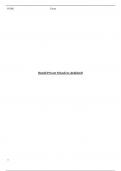PO301 Essay
Should Private Schools be abolished?
1
, PO301 Essay
The current private and state school divide in the United Kingdom is a contentious issue within normative political
theory, a branch focused on the 'morally appropriate standard and purpose for political actors and regimes' (Gillespie,
2023). Attended by only 7% of the population (Weale, 2016), condemnation towards private schools often draw on its
institutional role as a catalyst for inequality (Pande, 2014) and isolating elitism within its systems (Cross,2022). This
essay will contribute to the discourse and, by engaging with the contention around private education, will oppose its
abolishment on the grounds that it does not serve as a panacea for the underlying issues driving educational inequality.
By first focusing on the divisive nature of private schools, the essay will begin by disproving the claim that the social
divide (Davis, 2019) within the two-tiered education system impedes cohesion within society (Young, 2022),
dismantling the multifaceted nature of cohesion, non-perpetually bound to education. Following this, the essay will
address Swift's classifications of the positional and instrumental values of private schools (Swift, 2003), proving that
the case of abolishment will be countered by these goods transmitting through alternative mechanisms, such as tuition
and extracurricular endeavours. Later, engaging with political philosophy, the essay will evaluate private schools
against the Rawlsian framework of social justice (Rawls, 1971), unpacking the lexical importance of this account to
support the liberty of parents to send their children to private institutions. Concluding with a focus on how the broad
spectrum of private schools can be a force for good, the essay will counter myopic judgements about private schools
as elite-driven exclusive institutions (Jones, 2016), disclosing how abolishment will eradicate the specialised schools
that tailor teaching for specific student requirements and educational needs. This essay aims to reveal the multifaceted
nature of educational inequality, suggesting that a more pragmatic solution for this concern is not abolishment but a
dual system where efforts are pursued to bridge the divide between the private and state systems, ensuring opportunity
and educational quality is not the exclusive domain of any single tier.
In pursuit of defending the claim against abolishment, this essay will first address the contentious account suggesting
that private schools serve to amplify social divisions and impede cohesiveness within society (Cross, 2022), disclosing
how the underpinnings in support of this rationale are defective. First, outlining the argument, critiques of private
schools often perceive the divide they perpetuate beyond the mere physical separation in line with parental income,
acknowledging the microcosmic function this division has in breeding social segregation between different classes
from a young age (Davis, 2019). This posits the notion of private schools as 'self-enforcing echo chambers' from the
ability to isolate elitism (Cross, 2022) within its institutions, resulting in attendees often overlooking the various
inequalities and diverse configurations of society. Recognised as the existence of connectedness and solidarity among
groups in society (Nikolai & Helbig, 2021), social cohesion ensures inclusiveness and sustainability (Man, 2021),
entailing two main dimensions: the sense of belonging to a community and the relationship among members within
the community (Manca, 2014).In line with the first, broader definition, critiques often engage with the contact
hypothesis to help justify the impedance of connectivity and solidarity amongst young people attributed to private
schools. The contact hypothesis is a psychological phenomenon revealing the formation of prejudice through limited
intergroup contact (Hopper, 2019), a hypothesis used to heighten concern for skewed belief systems towards diversity,
2




